 |
 |
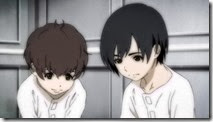 |
Not much in the way of surprises here, but when what you’re expecting is what I was expecting from Zankyou no Terror, that’s not a bad thing.
We’re still very much in the feeling out stages with Terror in Resonance, I think, which is interesting for such a short series. I’ve been trying to decide who the main character or characters of this show are, but that’s probably the wrong question because there doesn’t seem to be a single center of focus. Rather, we’re seeing a study of a chain of events (almost in the form of a recollection from some point in the future) from three main perspectives – Sphinx, Lisa, and Shibasaki. Each of them brings their own particular viewpoint to the process, and the tone of the series shifts quite dramatically depending on whose head we’re inside at any given moment.
While the narrative structure of this episode was somewhat similar to that of last week’s, this one was very much focused on filling in the blanks with Shibasaki. In many ways his story is quite cliched – a slightly roguish and eccentric former ace cop (“The Razor”) who’s had his career wrecked by poking his nose where the higher-ups don’t want noses poked, only to be recalled to the front lines when the cops aren’t able to handle the crisis. We have seen this many, many times in many mediums (including anime) but that doesn’t mean it can’t still be brought off successfully if it’s told with a measure of panache and the protagonist is an engaging personality. And so far, I’d give Zankyou no Terror pretty high marks on that score.
We got another video from Sphinx, another Oedipal riddle, another bomb and another battle of wits this week, and normally I’d be pretty worried that the series might be falling into a weekly pattern. I don’t want to see this repeating itself over and over, but I’m not overly concerned because my sense is that this is a transitional episode, one which brings the setup phase of the story to a close and ushers in the next. If I’m wrong it could be a bit of a problem (and I would feel better knowing who’s doing the writing) but I don’t think I am. We’ll know one way or the other next week.
The revelations about Shibasaki’s background – that he was exiled to the archives for refusing to accept the “official story” (it doesn’t get any more cliched than that) about the suicide of a Diet member – seem to suggest he’s the perfect casting for what Nine and Twelve are looking for. What seems destined to happen is for Shibasaki to follow a trail of breadcrumbs the boys leave for him, a trail which leads back to the institution from which they escaped. Rather than being upset that Shibsaki solves their riddle about the ancient (pre-Shinto, in fact) Japanese God Arahabaki and and the Shirahige Jinja next to which they’ve hidden their latest bomb, and the fact that the police have connected it to the Plutonium theft, the lads are genuinely pleased. One might posit that they’re simply eager to get into a fun battle of wits with a worthy opponent, but I think it’s more likely that they were trolling for someone smart enough to help them expose something the government is presumably extremely anxious to avoid seeing exposed.
The issue of morality as it applies to Nine and Twelve is both the most fascinating aspect of Zankyou no Terror and its biggest potential problem. There’s been a determined lack of focus on the loss of life from their first two bomb attacks – in fact it was expressly stated that no one died in their destruction of the Tokyo Metropolitan Government Building (which is preposterous). If this is nothing more than what it appears to me, I have to call BS here for trying to have it both ways – no matter what mitigating factors the boys have in their past, these are terrorist acts and innocent people will have died from them.
What gives me hope that Watanabe (or whoever is writing this series) understands this is Shibasaki being from Hiroshima, and thus quite personally connected to the notion of using the threat of a nuclear attack for personal and political means. He’s not going to soft-pedal what Nine and Twelve are doing, but the real conflict in the series may come when Shibasaki uncovers the truth of what the boys endured (and that seems quite brutal and inhuman indeed) and must weigh that against the evil that the boys themselves are perpetrating to expose it. He and Lisa are both going to be caught in the middle here most likely, albeit in different ways, and that seems destined to to drive much of the personal drama in Zankyou no Terror.
Plot aside, you know you’re going to get superlative execution in this series every week. With Yoko Kanno’s unusually wide-ranging soundtrack a constant but subtle supporting presence, Watanabe as always tells a story with pictures, managing in his particular way to be unobtrusive and minimal yet incredibly distinctive. I especially loved the way he presented Shibasaki’s memories of his childhood in Hiroshima, a “city full of old people” who disappeared in the summer, leaving the streets lonely and desolate for the child Shibasaki, as well as his low-key yet chilling depiction of the horrors the young Oedipus endured – left to die by his father in the forest with a nail through his foot. It’s no coincidence that Arata and Touji chose him as the centerpiece of their first two riddles, and their story promises to reveal dark and terrible details with each passing week. Let’s hope it ends more happily than the original did.
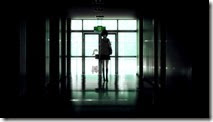 |
 |
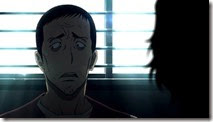 |
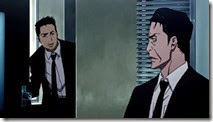 |
 |
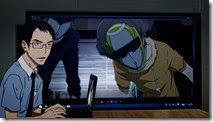 |
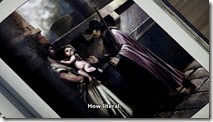 |
 |
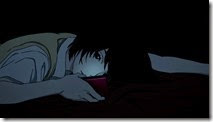 |
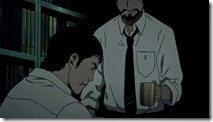 |
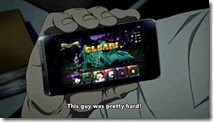 |
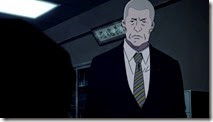 |
 |
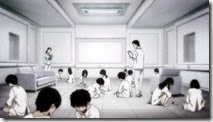 |
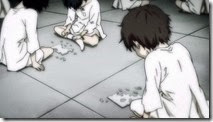 |
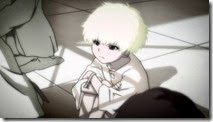 |
 |
 |
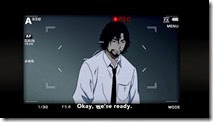 |
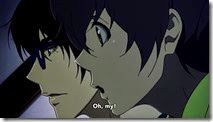 |
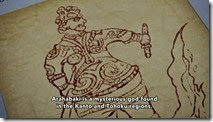 |
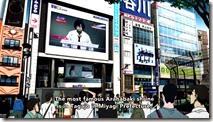 |
 |
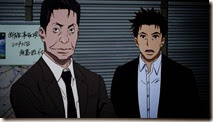 |
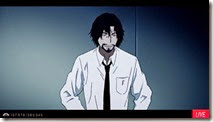 |
 |
 |


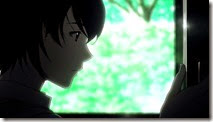
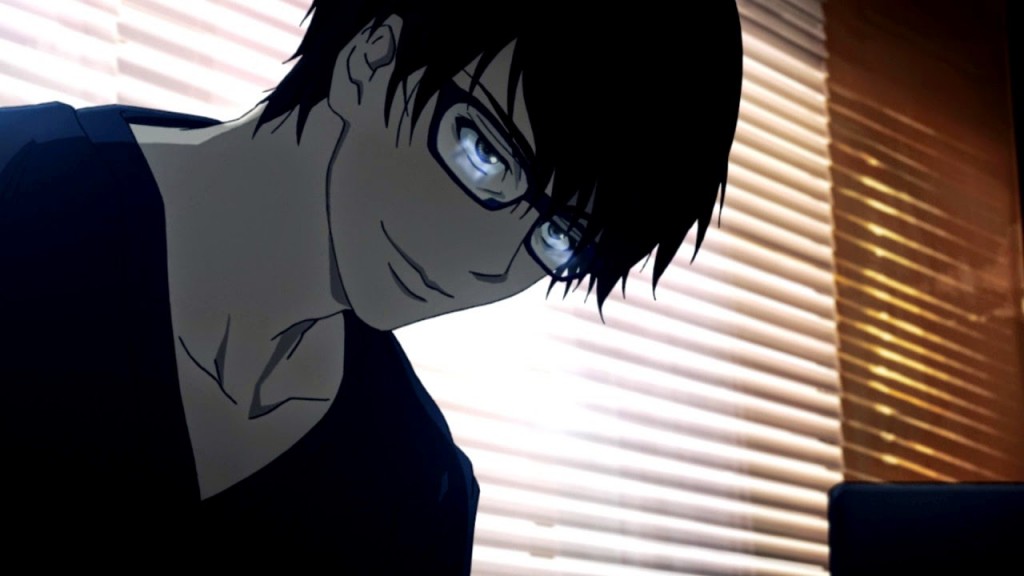
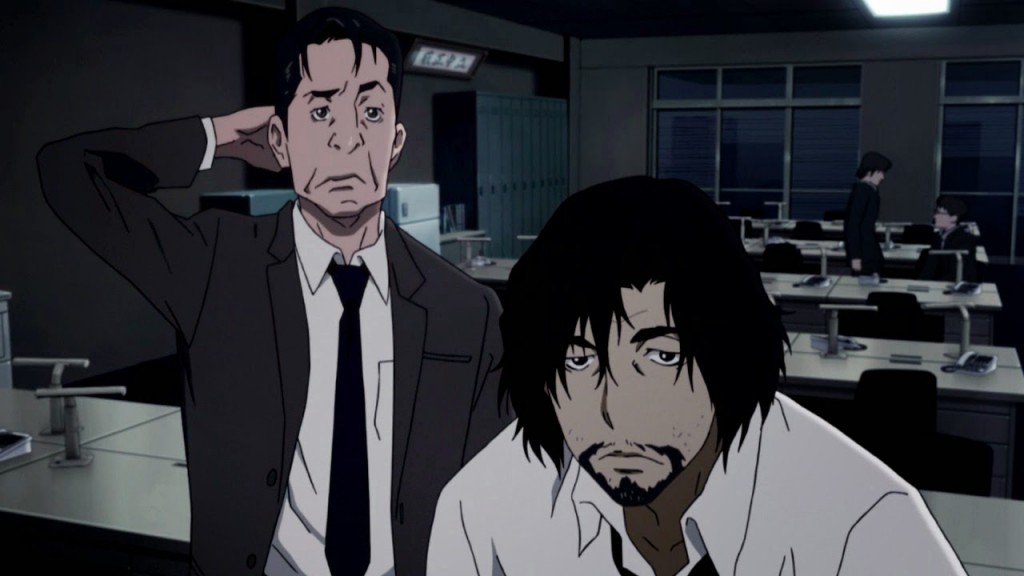
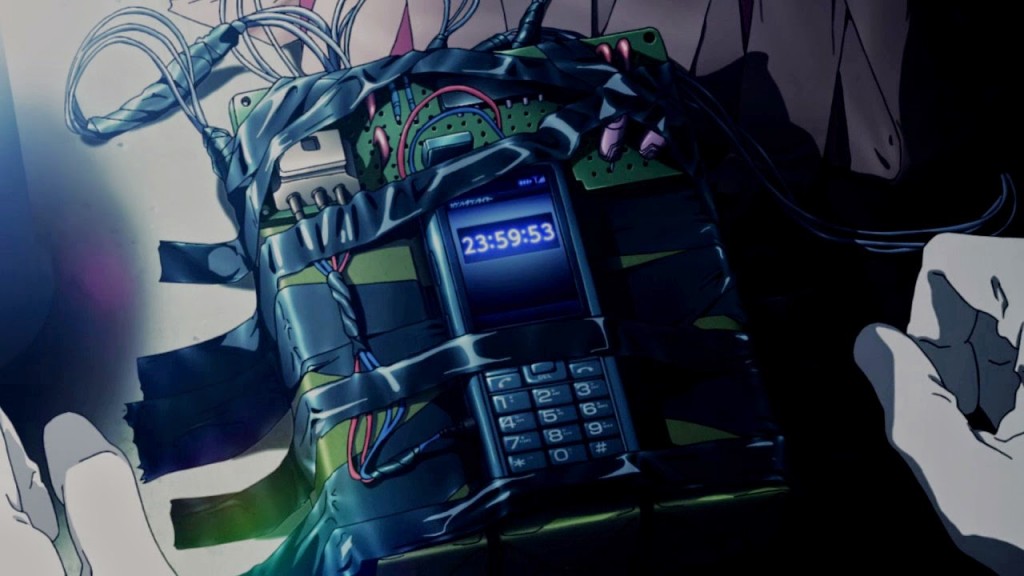
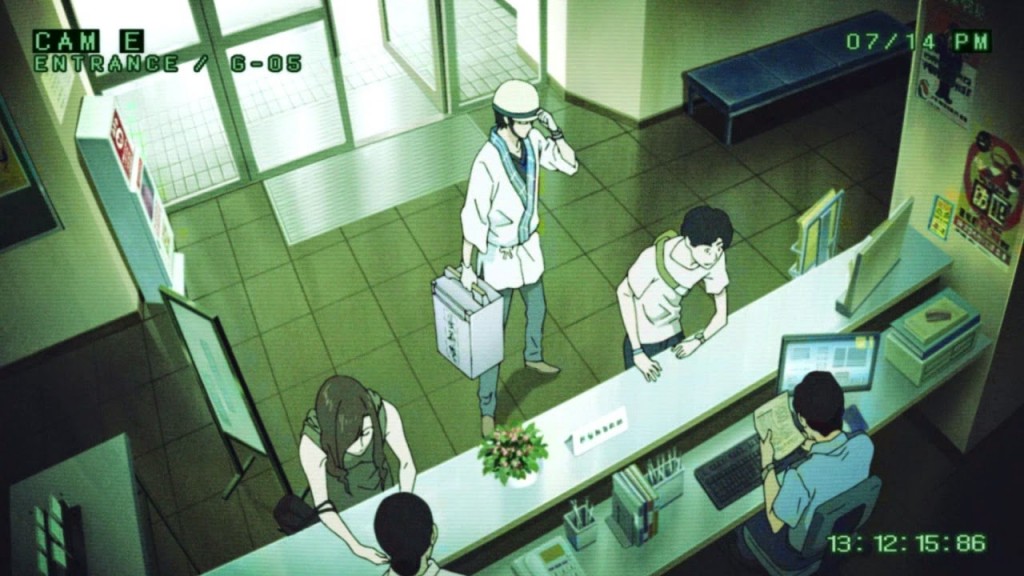
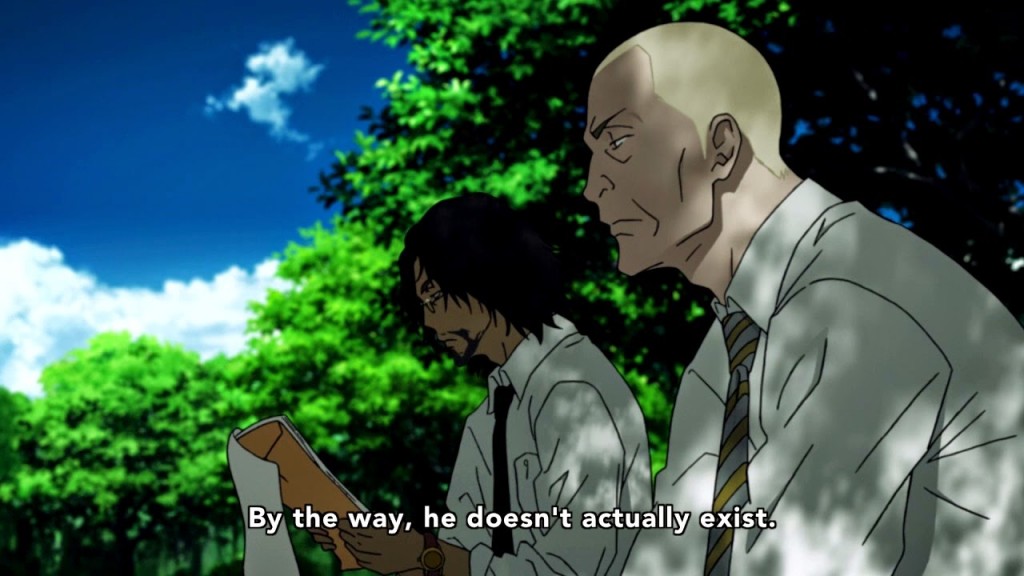
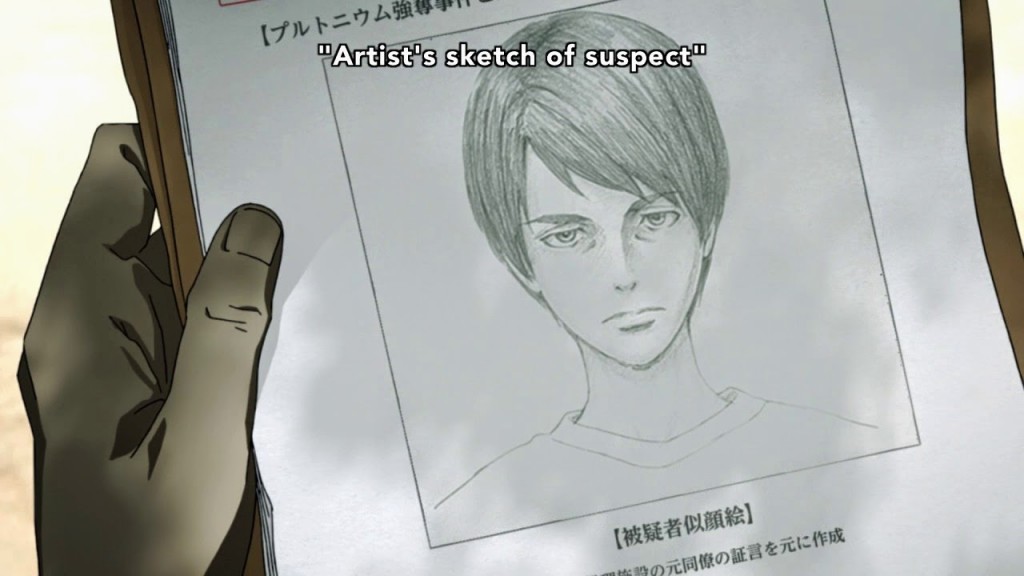
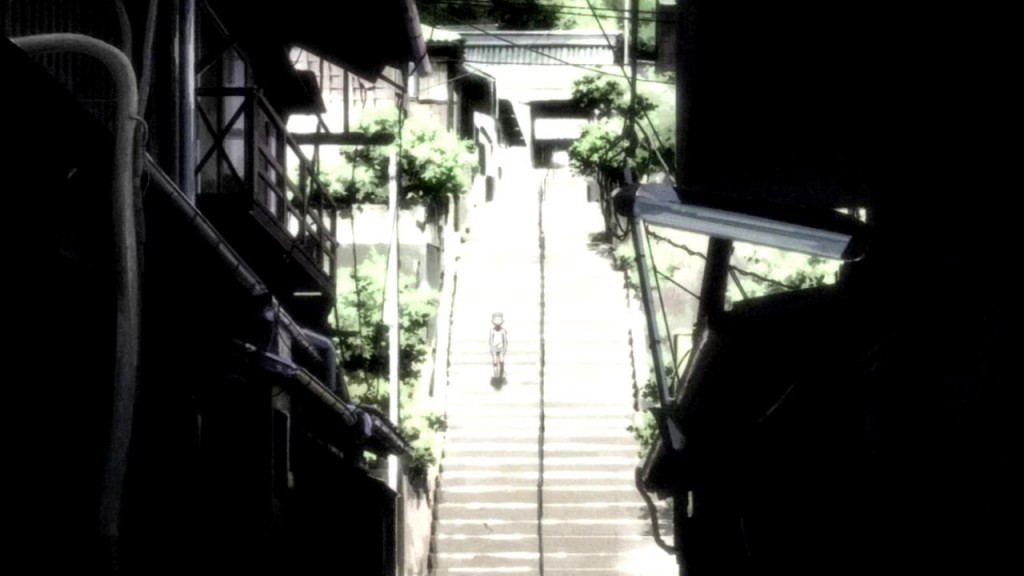
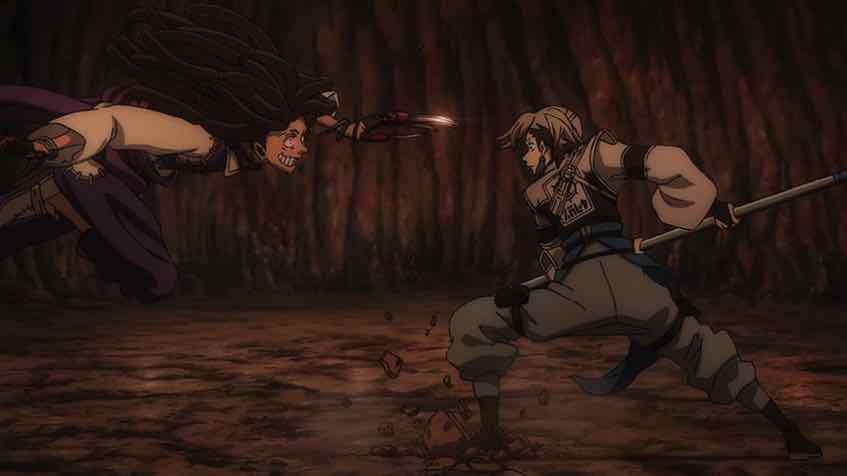
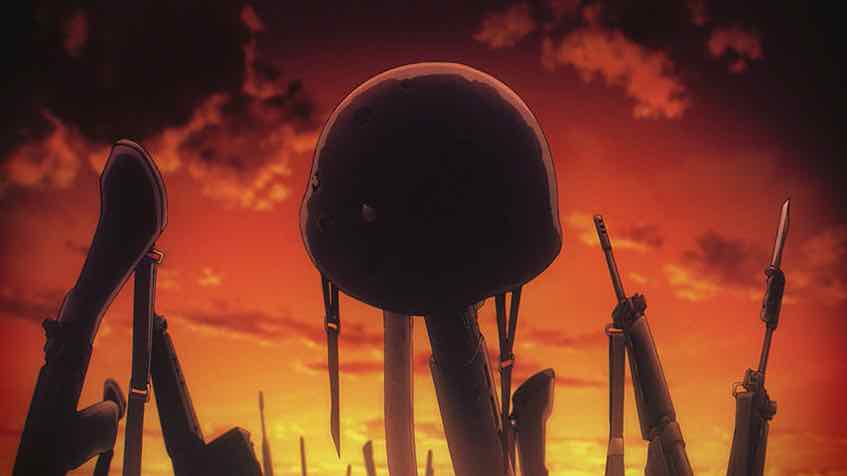
jim
July 25, 2014 at 3:07 amGiven some things I have noticed this episode:
– 9 and 12's only interactions with adults during childhood is a loveless one. From a young age, they were robbed of Love and instead given numbers
– The mock 'puzzles and dragons' game is a perfect example of CONNECTION that the main characters of the show lack. Extremely popular in Japan, and now spreading in the States as well, the game is about connecting with the people that you play the game with. The seemingly insignificant comedic side character seems to be the only adult in the show that is truly interacting with those of a younger generation.
– Shibazaki's past: he lived in a town where everyone was old, and didn't leave the house during the Summer. It was interesting that during his briefing at the park, he shrugged off the notion that he was involved in the case for the simple fact that he had personal feelings against atomic bombs. No, I think it was more-so the fact that it robbed him off connecting with folk from his town during summers.
– Lisa's childhood is also plagued with a huge disconnect, but from her parents. Her father leaves the household and her mother's selfish and possessive ways prevents any sort of meaningful connection between the two. She also seems to have no friends at school. In the end, she is the only one that doesn't belong ANYWHERE. 9 and 12 have each other despite their upbringing, Shibasaki is connected to his work/colleagues despite that resulting in him neglecting other aspects of his life. Only Lisa is completely alone, yet in the end I'm sure that she will be the one that will bring everyone together. Perhaps the main characters are all searching for the connections that they are lacking.
So far I'm not sure if the theme here is general disconnect between people, or disconnect between generations in Japan (similar theme in Battle Royale). I think it's both, but with a strong emphasis on the latter. To some, the connection to the people and things around them validate their existence and there's a terror in being uncertain to what your existence "means" in the world. This terror resonates among the characters, and that's what I'm seeing from the title of this show.
Gary Cochran
July 25, 2014 at 4:02 amSometimes I don't understand how Japanese people show love when they never touch or hug each other. I mean I know Japanese people love their children but you never see a parent in an anime hug or kiss their child good night.
admin
July 25, 2014 at 5:13 amJust because you rarely (not never) see something in anime doesn't mean it doesn't happen in real-life…
Roger
July 25, 2014 at 4:09 amOne nit pick I have here is that the connection from Oedipus to Arahabaki felt a bit wonky and hard to follow.
That aside, this is still an excellent episode. Slower than the provious two, but still intriguing. The way they build up the characters is just simply fascinating.
I am quite intrigued as to what the institution that Nine and Twelve stayed in really is. It doesn't feel like your average orphanage and seems to be more like a research facility conducting conditioning studies. Seriously, what kind of social welfare institution would want to do that kind of mental tampering to kids?
Aeolus
July 25, 2014 at 8:36 amI'm a bit of a huge mythology buff, especially Greek, so I love it when stuff like this pops in. That said, Shibasaki must have a degree in mythology, because it took me a moment to make sense of his Oedipal connection of Jocasta to dragons (it'd be more accurate to say she is the descendent of dragon teeth). The fact he connected that to an obscure (I think) Japanese deity is nothing short of Sherlockian.
whemleh
July 25, 2014 at 9:12 amStill good, but I do find it odd that Shibasaki is literally the only person in Tokyo who knows anything about Greek mythology.
Roger
July 25, 2014 at 9:35 amWell, considering that classical literature (particularly Western) is not something that many people would delved into on a regular basis, it isn't surprising that not a lot of folks in the police department are as well versed as Shibasaki (who could have read a lot of it to while away boredom at the archives) is in it.
admin
July 25, 2014 at 1:20 pmThere's plenty of Japanese folks who know some about Greek mythology, but it's not an everyday thing – just as it wouldn't be in most countries. And policeman here or elsewhere wouldn't normally be among the most likely candidates to be experts.
gilraen_tinuviel
July 25, 2014 at 5:18 pmOh yes, because if I went to a Greek police station, they would know plenty about ancient Japanese mythology, right?
whemleh
July 25, 2014 at 7:57 pmAll completely true, the presentation just struck me as odd. Like they were saying "Shibasaki, only you can solve this!" even though just about anyone could solve it with a little bit of research.
John I.G.
July 29, 2014 at 9:42 pmWell in the second episode that a lot of the police are putting together the hints and figuring out the riddle, they just fall into the same mistake anyone would make: Mistakenly assume the riddle is the one you know.
In this episode we also see the rookie cop frustrated and eager to solve the problems, but Shibasaki just outstrips them when it comes to making the connections. The head of the division leaves it up to him because he knows he's capable, and the head probably has more to deal with on the organisational side and running the whole city. Best to just leave it to Shibasaki.
They didn't say he was their only hope, they just figured they'd get out of the way.
Zeta Zero
July 26, 2014 at 6:07 amProbably the best new show of the season for me at the moment. It's a nice break from the usual anime sweatdrop theatrics, and has adults instead of little girls doing actual policework for once.
Zeta Zero
July 26, 2014 at 6:09 amIt goes down with Psycho-Pass Redux a treat.
John I.G.
July 29, 2014 at 9:43 pmTalking about little girls doing police work :b